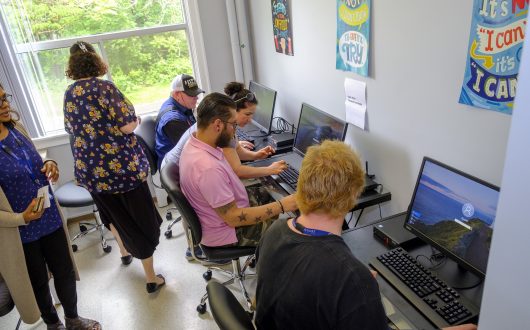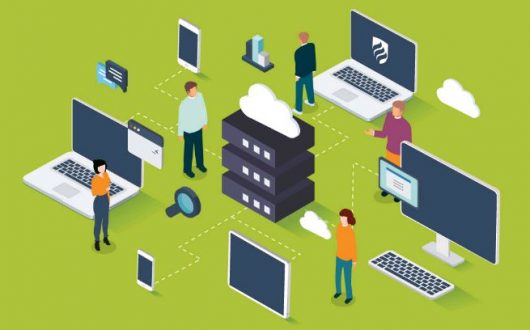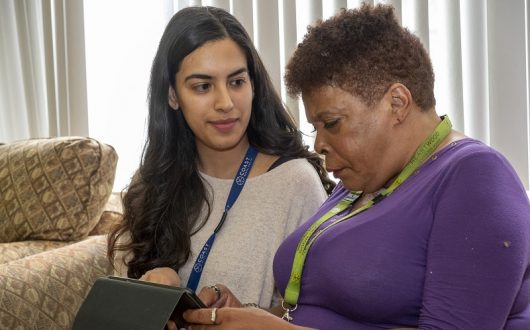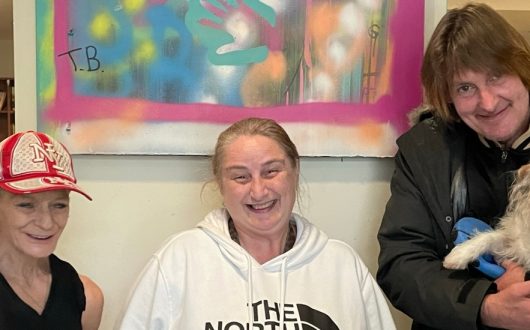
Cognitive e-learning tools build wellness for clients enrolled in Coast Mental Health’s Rehabilitation and Recovery Program
Over the past eight months we’ve faced unprecedented challenges as the world shifted to new digital platforms. Health care services were forced to innovate overnight, moving to virtual support services wherever possible.
The pandemic has shown us that technology is a powerful force in breaking down some barriers to care and mental health support. E-mental health has the potential to address the gap between the need for mental health services and current capacity and physical distancing limitations.
Conversely, we’ve been confronted with the glaring technology gap between the e-commerce economy and non-profit organizations.
Technology is an essential service

photo sourced from Elmhurst University
The gap or “digital divide” between those who have access to technology and the skills to benefit from it, and those who don’t has been exacerbated during the pandemic.
Too often, technology is viewed as “overhead,” which leads to inadequate funding of technology and IT initiatives in the non-profit sector. Integrating technology into mental health services is no longer a distant frontier and we need to start petitioning for digital services in all aspects of mental health care. Better technology means we can operate more efficiently and provide more comprehensive and more inclusive support to our clients.
Funding technology infrastructure and e-mental health services would provide more people with readily available, lifesaving tools. Non-profits like Coast Mental Health shouldn’t be expected to “make do” when providing critical support for people living with mental illness. Whether that’s working with outdated technology, or working with the limitations of outdated software, funding is needed to help non-profits operate efficiently, increase accessibility and serve more people in the community.
According to Chief Operating Officer at Coast Mental Health Bruce Smith, Covid-19 has accelerated the need for us to connect with people living with mental illness in new, innovative ways.
“What we’re trying to do, on our side, is be ready with all of the hardware, software, and people skills to be able to offer these services and branch out into what, I’m sure, is the coming wave of mental health services.”
We need to concentrate on what we can do offer better services to vulnerable populations and how technology can help get us there.
E-learning tools in mental health are now a critical component of how front-line workers administer essential care to people living with mental illness. We need to advocate for funding to establish new technology services to support the community and maintain important connections to support services moving forward.
TechNology Access for All

A client uses a tablet to track their recovery goals. This information is collected and used as part of regular assessments and wellness checks of clients across our organization.
Access to technology can bring people together, keep them informed, and create a sense of inclusion.
Peer Support Program Coordinator Natasha Reaney discussed how poverty is often a social barrier that prevents many clients from plugging into the digital world and accessing information and digital health care services.
“A lot of our clients don’t have cell phones, tablets, access to computers, or the internet. And that’s a huge barrier for us. We’re looking at how can we get technology into the hands of the people who need it the most so that we can connect with them,” says Reaney.
Computer access and an Internet connection should be available to everyone— so no one is left behind, especially those that need it most. At the root, we need to start recognizing technology as a fundamental human right.
| Coast Mental Health announces a new e-mental health initiative. Read more… |
This new era of e-mental health offers great opportunities for us to increase accessibility and efficacy of mental health supports. Existing and evolving technologies have tremendous potential to transform the mental health system and positively change how resources are developed, delivered and received.
For us to realize this potential, we need to call on the government to #fundmentalhealth. Let’s come together and advocate for investments in technology to support people living with mental illness.
Here’s how you can help:
· Read our 5 recommendations
· Use your voice and pledge your support
· Organize your own fundraising events to support our mission
· Donate today to one of our causes
· Partner with us on a solution in mental health



